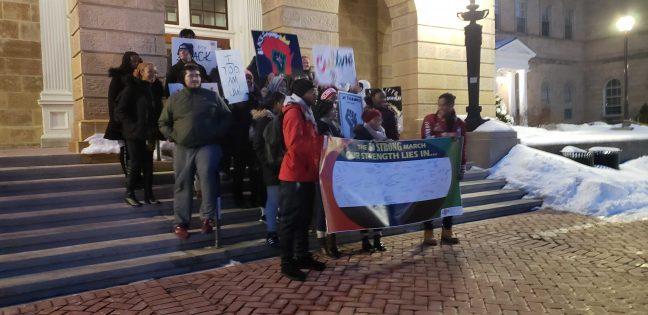Fifty years ago in 1969, black students at the University of Wisconsin organized a student strike. They had several demands, including an Afro-American studies department and more Black professors, a Black Cultural Center and more Black students. Their strike led to the creation of the Afro-American Studies department, scholarship programs and other civil rights advancements.
Wisconsin Black Student Union organized a march down Bascom Hill Monday to commemorate the strike. Several students and community members attended, including Madison Mayor Paul Soglin, who attended Madison at the same time the strike happened, and described some of his experiences witnessing the event firsthand.
“It was a disgraceful situation,” Soglin said in reference to the inequality on campus during that time.
UW Archives presents documents on 50th anniversary of 1969 Black Student Strike
In 1969, UW had about 90 black students, a number which has grown to 862 now. Soglin mentioned that the strike brought those involved together.
“I’ve maintained friendships and relationships with some of the students that were there,” Soglin said.
WBSU President Kingsley Pissang asked questions of the marchers, including how many were at UW through a scholarship program, and more poignantly, how many students in attendance felt isolated on campus at times. A majority raised their hands to both questions.
Pissang spoke about the motivation behind the march, and encouraged everyone in attendance to sign a banner about the source of their strength as a movement.
SSFC holds hearing on Black Student Union funding eligibility
“The reason we are gathered here today is to celebrate those who came before us,” Pissang said.
Pissang also mentioned that black students only make up about 2 percent of the population of the university.
Community member Jane Brotman attended the strike 50 years ago, returning Tuesday as a way to remember the things she’d learned from the movement.
“One of the things that was really wonderful about the black student strike was how many student participated,” Brotman said. “I think we had about 10,000 students marching down State Street in support of the Black Student Strike and that was just a wonderful experience to all be together and share that.”
The scale of the strike brought the National Guard to Madison, which Brotman said was scary.
Before marching down to the Red Gym, programming intern for WBSU Jared Biddle presented a personal statement about the strike. He spoke about several activists involved in the original strike, including Liberty Rashad, John Felder and Hazel Symonette.
“As a black student at the university today, I couldn’t imagine attending this school without [the Afro-American Studies department and the Black Student Center],” Biddle said.













